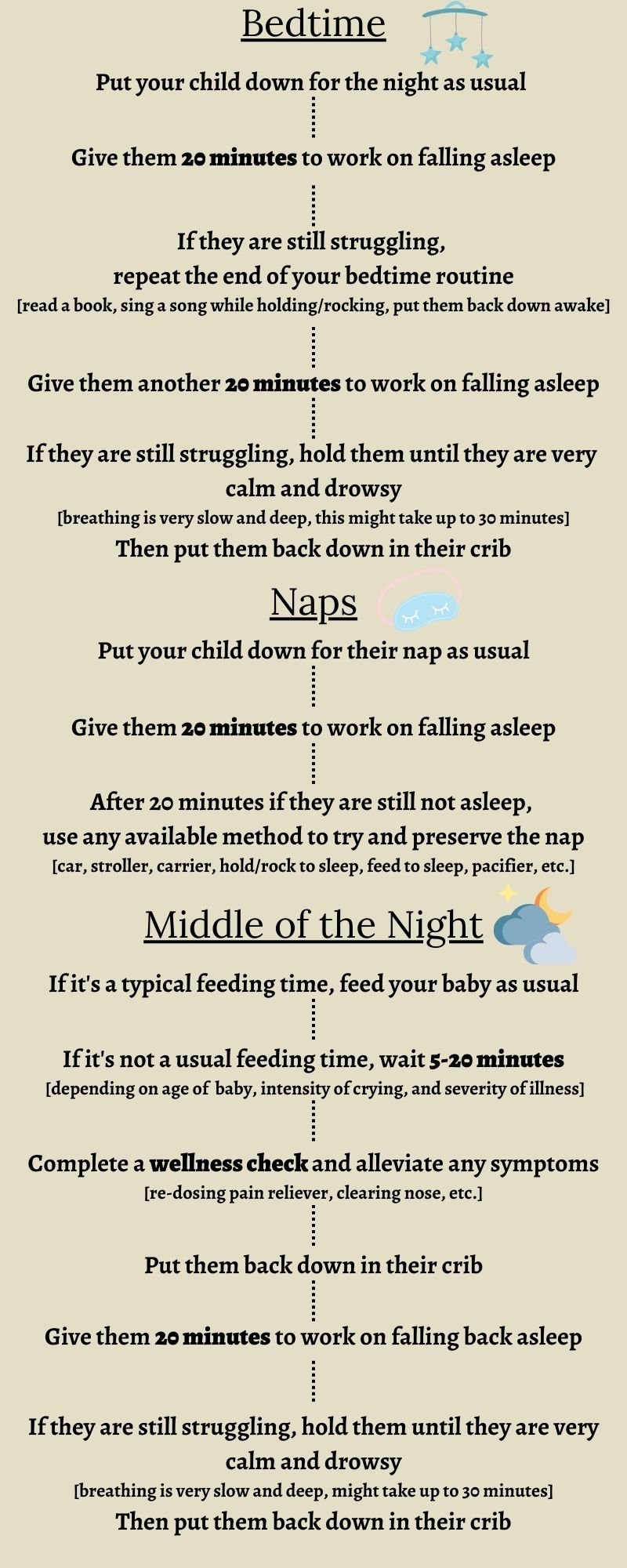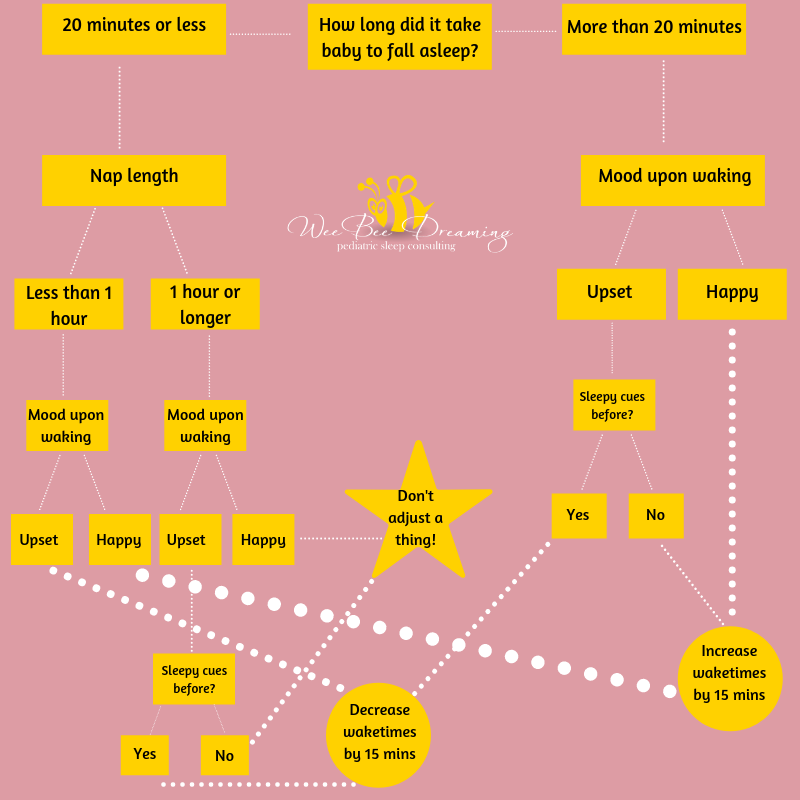There are many guarantees in your child’s life and one of the biggest guarantees is that at some point, your child is going to get sick. The average child under age 2 will come down with an illness 6 times/year. And if your child attends daycare, that number could be doubled. Depending on the severity of the illness, a child’s sleep can really derail when they are feeling under the weather. Many parents struggle to know what to do when their child is sick - do all the rules go out the window? Do we still try to remain consistent? What should we be flexible with and where should we draw a hard line? Enter - this post! While it certainly is impossible to give a concrete game plan for your child when they are ill as it absolutely depends on the severity of the illness, this post is meant to give you a framework to work with so that hopefully you can rebound more easily when your child is back to full-strength. Happy reading!
Why do illnesses impact sleep?
As I always tell families, when dealing with a sick baby or toddler, we have to consider that their psychological needs need to be met as well. We want them to know that if they are unwell, we will be there to help them through it. Trouble arises when we need to introduce certain sleep associations to help them sleep when they aren’t feeling well [rocking, holding, nursing, bottle, etc.] as while these associations may not be inherently ‘bad’, especially when your child is needing support, the expectation of these associations continuing even once they are feeling better can be very high, especially with a toddler. As I’m sure you’ve experienced, it can be very difficult to sleep with a sore throat, cough, fever, ear ache, etc. and children need help managing these symptoms, but the key is that the day your child is better, we need to get back to our normal schedule/routine. Bigger issues arise when we allow the new habits to linger past the healthy point as more often than not, even if we’ve had to bring in all the big guns to help your child sleep, it should only take around 3-5 days to get back on track if we do so in a timely manner. If weeks have gone by since your child was sick and you are still supporting heavily to sleep, a bigger sleep training endeavor may be required.
Which rules should we try to follow?
Just because your child is sick, it does not automatically mean that all rules are out the window. Many children can maintain the same sleep habits when sick [and some even sleep harder/more easily/longer!] so it’s always important to give your child a chance first before we add extra support. Some rules to try and follow include:
If your child is an independent sleeper, aim to still put them down awake for all sleep times and see if they are able to manage without extra support. Keep reading to find out what to do if this is not the case.
If your child sleeps in a crib/their own bed, try to keep this consistent [vs. bringing them into your bed - this can be a very difficult association to remove, especially with toddlers!] If you would like to monitor your child more closely, consider making a bed on the floor of their room for yourself.
If extra support is needed, try to intervene as minimally as possible at first, adding extra help as required. This means still waiting at night during any wakings, trying to comfort them in their crib first before moving to a pick-up if needed, and trying to save extra feeds as a last resort unless dehydration is suspected. Check out the information below for an actionable game plan for bedtime, naps, and the middle of the night!
Which rules are okay to break?
While not all rules go out the window when your kiddo is unwell, there are some rules that we certainly want to break in the spirit of giving your child the best chance possible to ward off their illness. These rules include:
Waking them at a certain time in the morning [let your child sleep as long as they need!]
Waking them at a certain time from their naps [let your child sleep as long as they need!]
Following any sort of schedule [waketimes, by the clock, etc.] When your child looks tired, let them sleep/help them to sleep.
Worrying about feeding too close to sleep or any sort of feeding schedule through the day - your child needs plenty of rest and plenty of fluids.
How else can we help our babies/toddlers when they are unwell?
A nightly warm bath [especially helpful if you can run a hot shower first with the door closed to steam up the room for congesion]. If your child has a fever, a lukewarm bath [not cold!] would be ideal.
Using a humidifier/vaporizer for congestion/cough. My favorite can be found here!
A massage before bedtime can help with any body aches.
A nasal aspirator [or ‘snot sucker’ as we like to call it] is worth its weight in gold. I literally do not know how any family can survive without one of these! Definitely one of my most highly recommended baby products.
Offering medication as needed [especially 30 minutes before bedtime]. Wondering about which to use? Advil/Motrin [ibuprofen] are anti-inflammatories so will be especially helpful for illnesses with inflammation [croup, teething], and for higher fevers. It also lasts longer than its counterpart but should only be used in babies 6+ months of age. Tylenol [acetaminophen] would be the better option for stomach pain/upset and can be used for babies under 6 months. As always, make sure you are using the correct dosage and consulting your pediatrician with any questions or concerns. Parents should not hesitate to contact the pediatrician if a child continues to have a persistent fever.
Managing sleep during illness is never easy, even when a child isn't severely ill. All children have different tolerance levels for illness and some can seem to be impacted by even a minor cold. If all else fails, do what you need to do and don't worry about creating bad habits. And if you are in need of support to help get your healthy child back on track, do not hesitate to reach out!
Pam Edwards is a Certified Infant & Child Sleep Consultant and founder of Wee Bee Dreaming Pediatric Sleep Consulting, based out of Kamloops, B.C. Healthy sleep is addicting and she has made it her life mission to help families all across the world get the sleep they deserve - a good night's sleep doesn't have to be a dream!






![BACK TO SCHOOL! 📚 🍎
While there is a lot of uncertainty in our house with school this year [as I'm sure most families are experiencing!] one thing for certain is that we've got to scale back our ☀️summer bedtimes☀️ for back to school next week!](https://images.squarespace-cdn.com/content/v1/52531afee4b0f4b1f8aa79be/1601470556866-QORB0LBNG8Q204V7Y50N/image-asset.jpeg)

![CONTEST CLOSED⭐️GIVEAWAY/REVIEW!⭐️
I may have found my new favorite sound machine - introducing the SNOOZ!
Why do I ❤️love❤️ it so much?
🎵Lately I've been a big fan of pure #whitenoise [i.e. not an audio track] and the @snooz has a re](https://images.squarespace-cdn.com/content/v1/52531afee4b0f4b1f8aa79be/1601507619148-KSB6PM01DMX88BN903PG/image-asset.jpeg)
![DREAMFEEDING! 🌙 🍼
I've never done a DF with any of my kids [mainly because as babies I felt I worked so hard to get them to sleep, I'd be darned if I was going to risk waking them up!] but I've seen it work amazingly well for families I'm worki](https://images.squarespace-cdn.com/content/v1/52531afee4b0f4b1f8aa79be/1601507619148-1CJQR7LI3HD59XAKDBJK/image-asset.jpeg)





